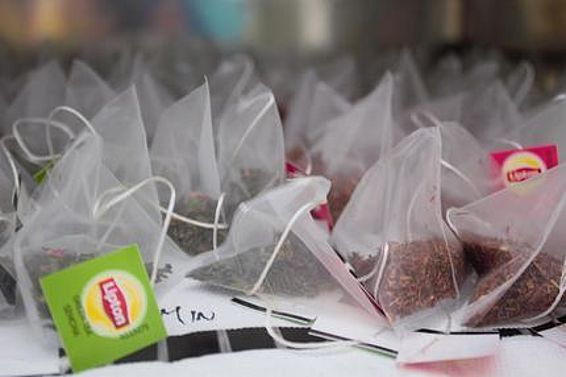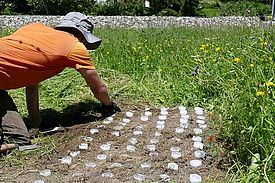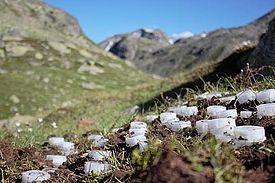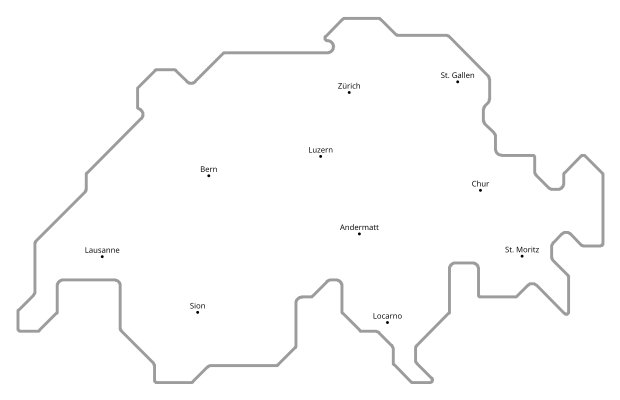Tea time on mountain summits
Sonja Wipf
Project staff2017 - 2021
Improving knowledge of decomposition processes in mountain soils

The disintegration of dead plant material (litter degradation) plays a key role in the global carbon cycle. When a plant dies, microorganisms break down its organic material. The greenhouse gas CO2 is released during this decomposing process. Increases in both atmospheric CO2 and temperatures can promote vegetative growth and thus enable plants to absorb larger quantities of carbon. But what are the implications for the soil? Does it serve as a carbon sink, or does plant material decompose faster and release larger amounts of carbon dioxide?
These processes and their underlying mechanisms have already been studied in great detail in temperate climate zones, but very little data has been collected to date in the mountains. In order to gather more information on the rate of litter degradation, Sonja Wipf and Christian Rixen of the SLF are applying the Tea Bag Index protocol in a series of studies in mountain soils.
How does the tea bag method work?
The uniform substrates are Lipton nylon tea bags containing green tea, which decomposes relatively quickly, and rooibos tea, which breaks down more slowly. The tea bags are weighed and then buried in the soil. At certain intervals (e.g. 3 months, 1 year) they are recovered, dried and weighed again. Based on the weight loss, the researchers calculate the rate of biomass decomposition.
This simple method has been adopted worldwide as scientists seek answers to a variety of research questions, such as the dependence of decomposition rates on climate or soil properties. In the international TeaComposition project, for example, the SLF is using the tea bag method on mountain summits in order to compare long-term decomposition rates in different mountainous regions and altitude zones. The seven sites are also integrated in the GLORIA project (Global Observation Research Initiative in Alpine Environments), and are located in and around the Swiss National Park.
Across the world the same types of tea are being buried and examined on mountain summits in 12 countries on four continents (Europe, Asia and North and South America).
Researching other aspects


Jonathan von Oppen (candidate for a master's degree at the SLF) is conducting further experiments that complement this tea bag experiment on mountain summits. In addition to the two types of tea, he is measuring the decomposition rates of two indigenous plant species, namely (Dryas octopetala [mountain avens, which is thought to decompose fairly slowly] and Anthyllis vulneraria [kidney vetch, which is regarded as more readily degradable]). First, Jonathan wishes to examine whether the indigenous plants, if they occur naturally at the site, are broken down more quickly by the soil microorganisms. And second, he would like to obtain a realistic picture of local decomposition and the amount of released CO2.
Another aspect which is being investigated is the influence of temperature on the decomposition processes of the different litter types. Differences that exist over small distances, such as the aspect, exert a major influence on temperature in the mountains. For that reason, tea bags have been buried in all four principal aspects (N, E, S, W) on each of the summits in order to examine the local variability of the decomposition rate.
The tea bag method does not allow the effect of the temperature to be separated from other local differences, however, such as those existing in the soil. An additional experiment is therefore being conducted in which the various types of litter are exposed to different temperatures under controlled conditions. It entails "vaccinating" standard mixes of compost and sand with microorganisms collected from the various summits, placing these samples in plastic containers together with tea bags, and burying the containers in Davos (1560 m) and on the Flüela Pass (2390 m). This will enable the scientists to determine the extent to which any differences in decomposition are attributable to the influence of temperature or to microorganisms which exist on individual mountains.
Links
- GLORIA: Global Observation Research Initiative in Alpine environments
- GLORIA: Project Homepage
- Summit flora
- Mountain ecological systems research group
- Swiss National ParkTundra tea bag experiment
- teatime4science
